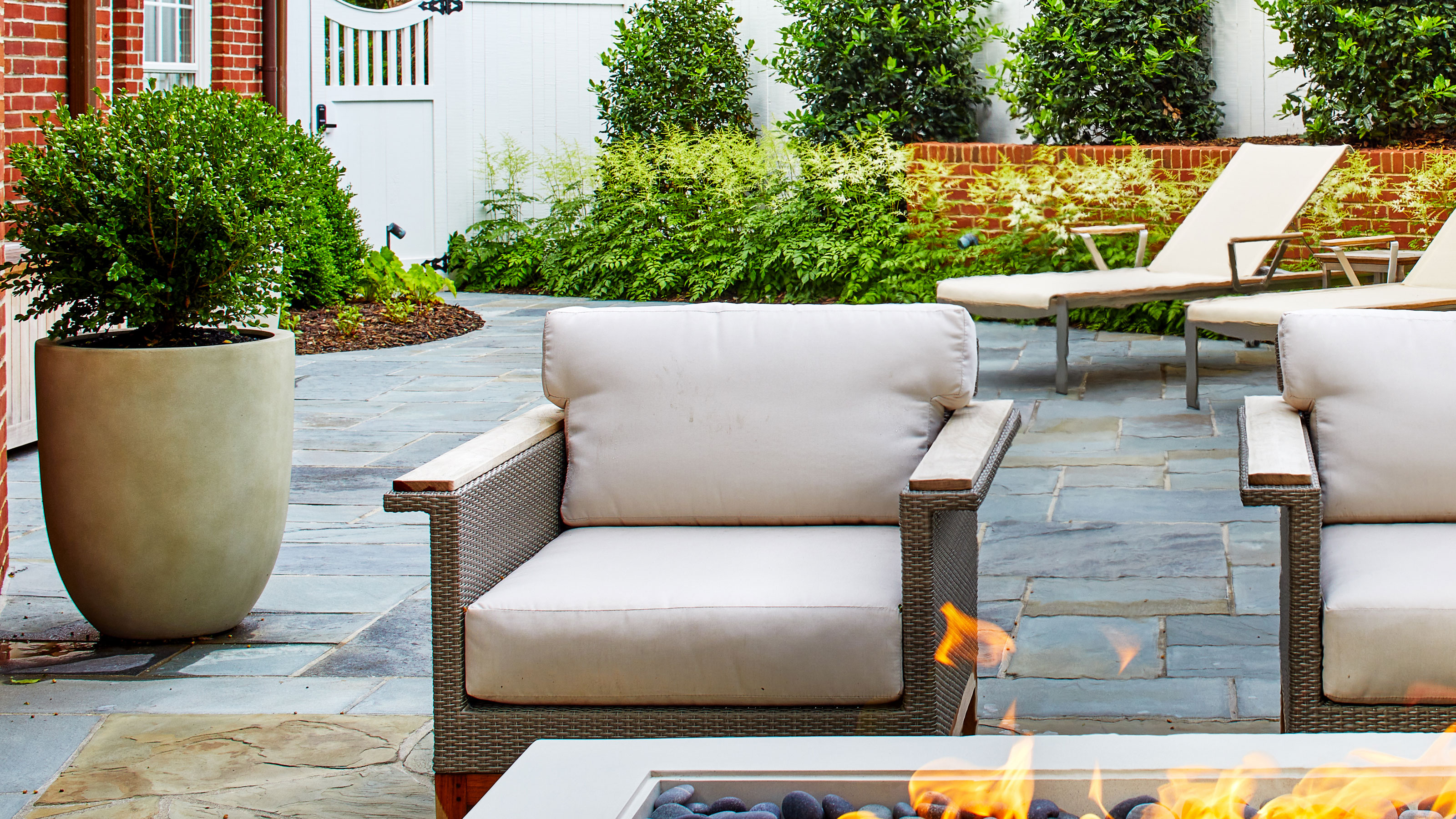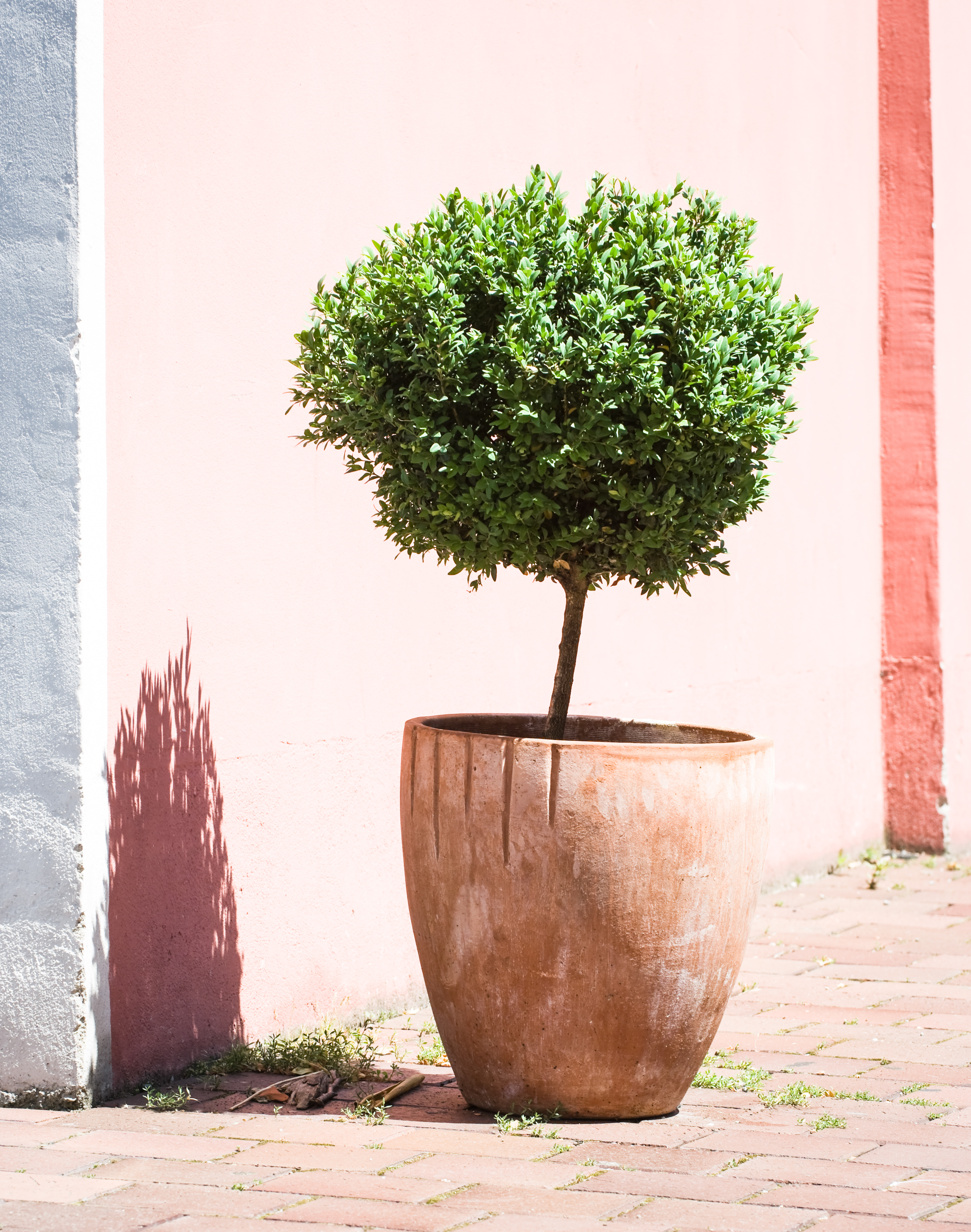
If your patio is looking quite bare-faced, perhaps potted shrubs could be its saving grace. Container gardening is a great way to bring in some lush foliage to a yard that's slightly lacking. Even in smaller spaces, leafy shrubs make quite the impression as they are reliable and easy to grow. But knowing which ones are best suited to pots, isn't quite so simple.
Shrubs are know to be low maintenance — making gardening a whole lot easier. Whether you are looking for shrubs with a fragrant foliage, or bushier varieties to form a barrier for added privacy, there's a shrub out there to have you covered that works well for container gardening.
Before you begin your container gardening journey, you need to evaluate if the shrub you choose to plant will be able to grow happy and healthy in the confines of a pot. With the help of some expert gardeners, we've put together a list of the six shrubs that are perfect for pots, so you can turn your plain patio into a pretty oasis in no time.
1. Boxwood

A popular shrub found in many front yard landscaping schemes is the boxwood. This wide-spreading plant has a mass of dense, evergreen foliage which makes it a favorite for topiary or for flanking a porch, and while it can also be used for hedging or grown as a small tree, it will also perform well in a pot, too.
'Boxwood shrubs can be pruned into various shapes and forms, and they have a shallow root system that makes them ideal for container gardening,' explains Aditya Abhishek, plant expert and founder of Agriculture Review. 'They maintain their shape in pots and can tolerate pruning well, meaning they can be used to create formal hedges, topiaries, or geometric designs in a backyard.'
Hardiness zone: 5-9
Soil: Loamy soil
Sunlight exposure: Full sun exposure for around 4-6 hours and part shade
2. Dwarf Japanese Maple

If you want to add a splash of color to your outdoor space, the Japanese Maple is a great option. 'This stunning shrub showcases vibrant foliage in various hues, from fiery red to delicate green,' explains Tony O'Neill, professional gardener and blogger at Simplify Gardening. 'Combine different varieties to create visual interest and texture that complements your overall garden design.'
The Japanese Maple is also one of the best trees for small gardens that can be container-grown, but if you want to keep yours compact and shrub-like, choose a dwarf or weeping variety that won't grow tall woody stems. As Tony adds: 'Their compact size and slow growth make them ideal for containers and the cascading branches and delicate leaves create an elegant focal point in any garden.'
Hardiness zone: 5-8
Soil: Sandy, acidic
Sunlight exposure: 4-8 hours of sunlight per day
3. Rosemary

For fragrant foliage that will make your backyard smell divine, rosemary is the perfect potted shrub especially for achieving a Mediterranean garden. The woody, aromatic herb has evergreen needle-like leaves which can be used when cooking and it also offers small blue flowers in the summer months.
While this flavorsome herb prefers soil on the dry side, like any potted plant, it's important to water regularly as the plant won't be able to absorb moisture through the ground (a common container gardening mistake that beginners make). As Adita notes: 'The hardy shrub also thrives in well-draining soil when potted.'
'Plant it in pots and place them near outdoor seating areas to enjoy its fragrance, or use it as a scented edging plant,' he adds.
Hardiness zone: Zone 7
Soil: Well-draining, loamy
Sunlight exposure: At least six hours of direct sunlight
4. Hydrangea

Hydrangeas make a colorful addition to your landscaping ideas, and dwarf varieties are great options for container gardening. 'Dwarf hydrangeas have large, showy flowers that come in various colors, including blue, pink, and white,' says Aditya. 'You can grow them in medium to large-sized pots and place them on patios, decks, or near entrances to add a pop of color.'
When it comes to potted hydrangea care, according to Tony, this shrub is an excellent choice for shady gardens. 'This is because they prefer partial shade and moist soil, making them well-suited for patios or shaded areas where they can bring a burst of color to the surroundings,' he says. You can also alter your soil's pH to change the color of blooms that your plant produces.
Hardiness zone: 3-9
Soil: Well-draining, loamy
Sunlight exposure: 4 - 6 hours of direct sunlight
5. Lavender

For another sweet-smelling addition to your backyard, lavender is a great shrub that's suitable for containers. 'This fragrant shrub is known for its beautiful purple or blue flowers and aromatic foliage,' says Aditya. 'Plant it in pots along pathways or near seating areas to enjoy its soothing fragrance.'
Similar to rosemary, lavender likes a sunny spot and well-draining soil. Its purple flowers make a bright contrast to a classic terracotta pot, and the tall stems can make quite the spectacle lined up against a wall. 'Place taller ones at the back of a container arrangement and shorter ones towards the front for a balanced look,' says Tony.
Hardiness zone:
Soil: Well-draining, Sandy Loam
Sunlight exposure: At least 6 hours of direct sunlight
6. Japanese Pieris

Finally, Japanese Pieris - also known as Pieris japonica or Japanese andromeda - is a beautiful flowering if you want a burst of bright color that changes with the seasons.
'Japanese Pieris is an evergreen shrub with glossy, leathery leaves that turn red through the seasons,' says Aditya. 'It produces clusters of white or pink bell-shaped flowers and has a shallow root system, making it suitable for pots. Plant it in pots and arrange them in groups to create a layered effect.'
It's important to note that Japanese Pieris is toxic to both animals and humans so place it out of reach of pets or children. As Tony reminds us: 'It's also important to pay attention to each shrub's sun and shade requirements, ensuring they receive optimal growing conditions.' This one prefers full sun to partial shade, so place it somewhere it will receive plenty of sunlight if you want it to look its best.
Hardiness zone: 4-8
Soil: Moist, well-drained
Sunlight exposure: At least 4 hours of direct sunlight







